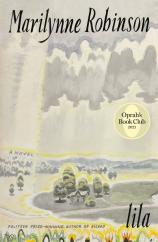Lila
Review
Lila
Reading Marilynne Robinson’s new novel LILA, her third set in the small Iowa town of Gilead, one senses that, given enough time and energy, she could produce an endless stream of fiction based on the lives of its inhabitants. In this book, she revisits the world of Reverend John Ames, the Congregationalist minister who was the protagonist of her 2005 Pulitzer Prize-winning novel, GILEAD. Here, however, we see that world from the point of view of his wife Lila, the much younger woman who’s the mother of the seven-year-old son Ames addresses in the long letter that is GILEAD. While it possesses the same quiet, reflective tone and stately pacing of that book and its successor, HOME, LILA is a distinctive story of one ordinary woman’s search for life’s meaning, told with beauty and deep insight.
The way the lives of Lila and Reverend Ames, a longtime widower whose wife and daughter died in childbirth, intersect, though as accidental as the hitched ride that makes it possible, seems almost providential. Rescued as a young girl from an abusive home by a woman named Doll, Lila joins a group of men and women who wander the countryside in Depression-era America, subsisting on odd jobs and sometimes paid in produce instead of money. But when Doll kills a man in a knife fight, Lila, now a young woman, understands she has to make her own way in this unforgiving world.
"LILA is a distinctive story of one ordinary woman’s search for life’s meaning, told with beauty and deep insight.... a novel that’s best read slowly, the better to appreciate the carefully constructed unfurling of this story."
Nothing in Lila’s past, revealed in flawlessly executed flashbacks, has prepared her to encounter the man of faith when she arrives in Gilead. With great tenderness, Robinson portrays how Lila overcomes her skepticism about religion generally and its embodiment in Ames, someone she refers to more than once as a “beautiful old man.” Ames’ patience and generosity toward the young woman rewards him with a loving marriage and a son, long past the point when a man in his circumstances would have any reasonable expectation of those gifts. Their backgrounds couldn’t differ more strikingly, but as two souls who have absorbed devastating blows from life and somehow managed to survive and persevere, they share an unspoken bond that makes a love story that seems implausible on the surface fully believable. “Pity us, yes, but we are brave,” Lila reflects on the novel’s final page, “and wild, more life in us than we can bear, the fire infolding itself in us. That peace could only be amazement, too.”
“She wasn’t getting religion, she just wanted to know what he was talking about” is Lila’s explanation for helping herself to a Bible from one of the church’s pews and then laboriously copying passages as a way of immersing herself in the book. Not content to absorb the stories of Genesis, she trains her fierce attention on some of the thornier books like Ezekiel and Job. Comparing her own experience to what she reads there, she observes that she “never expected to find so many things she already knew about written down in a book,” and it’s moving to watch her painstakingly acquire the spiritual vocabulary that will help her grapple with the riddles of faith and doubt.
Though its concerns are theological, LILA is not a dogmatic novel. This year has produced several novels --- Joshua Ferris’ Booker Prize-shortlisted TO RISE AGAIN AT A DECENT HOUR, Joshua Max Feldman’s THE BOOK OF JONAH and Michael Cunningham’s THE SNOW QUEEN --- that have tackled spiritual themes. The difference between those strong books and this one is that they approach the subject through the eyes of a protagonist who’s a highly-educated skeptic. Robinson’s fully-realized main character, in contrast, possesses only the most rudimentary tools --- her harsh life experience and basic literacy --- to accompany her on her spiritual journey, but Robinson imbues every moment of it with dignity and profound seriousness.
LILA is a novel that’s best read slowly, the better to appreciate the carefully constructed unfurling of this story. There are few moments of real dramatic tension, and what violence there is occurs offstage. The book’s calm loveliness is reflected in passages like this one, describing a March blizzard shortly before Lila and John’s son is born:
“There was night everywhere and snow, under a big moon. Beyond the few lights of Gilead the great white nowhere that the wind had all to itself, the frozen ponds and stricken cornfields and the ragtag sheds and shacks. That wind would be clapping shut and prying open everything that was meant to keep it out, bothering where it could, tired of its huge loneliness.”
Today, when the demands and rewards of traditional faith typically don’t provide the stuff of commercial fiction, any author takes a considerable risk in setting not one, but three novels in a realm that’s preoccupied with those concerns. The great pleasure of this novel certainly is enhanced by having read its two predecessors, but this graceful story stands fully on its own, an exquisite point of entry into the world of Gilead. Thoughtful readers will want to linger there for a long, deeply satisfying stay.
Reviewed by Harvey Freedenberg on October 15, 2014
Lila
- Publication Date: October 6, 2015
- Genres: Fiction
- Paperback: 272 pages
- Publisher: Picador
- ISBN-10: 1250074843
- ISBN-13: 9781250074843





